- Home
- Patricia McLinn
Death on Torrid Ave.
Death on Torrid Ave. Read online
Death on Torrid Avenue
Secret Sleuth, Book 2
Patricia McLinn
Paws for a murder
Far from the publishing world that once defined her, Sheila Mackey has found a new life, a new home and a new love: Gracie the rescue collie. Too smart for her own good — certainly too smart for Sheila’s good, when Gracie discovers a dead body at the dog park. Not good for an amateur sleuth with a big secret of her own that she intends to keep. She’s not exactly who she pretended to be for 15 years.
Will Sheila untangle the murder mystery before her secrets are untied, exposing her previous identity to her new small-town neighbors?
Secret Sleuth series
Death on the Diversion
Death on Torrid Avenue
Death on Beguiling Way
Death on Covert Circle
Other mystery from Patricia McLinn
Caught Dead in Wyoming Series
Sign Off
Left Hanging
Shoot First
Last Ditch
Look Live
Back Story
Cold Open
Hot Roll
Reaction Shot
“While the mystery itself is twisty-turny and thoroughly engaging, it’s the smart and witty writing that I loved the best.”
— Diane Chamberlain, New York Times bestselling author
Mystery with romance
Proof of Innocence
Price of Innocence
“Evocative description, vivid characterization, and lots of twists and turns.”
— 5-star review
Ride the River: Rodeo Knights
Bardville, Wyoming series
A Stranger in the Family
A Stranger to Love
The Rancher Meets His Match
Join Patricia McLinn’s Readers List and get news on releases and special deals first.
Copyright © Patricia McLinn
ISBN: 978-1-944126-39-1
EPUB Edition
www.PatriciaMcLinn.com
All rights reserved. No part of this book may be reproduced in any form or by any electronic or mechanical means, including information storage and retrieval systems, without permission in writing from the publisher, except by a reviewer, who may quote brief passages in a review.
Cover design: Art by Karri
* * * *
Dear Readers: If you encounter typos or errors in this book, please send them to me at [email protected]. Even with many layers of editing, mistakes can slip through, alas. But, together, we can eradicate the nasty nuisances. Thank you! — Patricia McLinn
Table of Contents
Cover
Title Page
About the Book
Copyright Page
Prologue
Chapter One
Chapter Two
Chapter Three
Chapter Four
Chapter Five
Chapter Six
Chapter Seven
Chapter Eight
Chapter Nine
Chapter Ten
Chapter Eleven
Chapter Twelve
Chapter Thirteen
Chapter Fourteen
Chapter Fifteen
Chapter Sixteen
Chapter Seventeen
Chapter Eighteen
Chapter Nineteen
Chapter Twenty
Chapter Twenty-One
Chapter Twenty-Two
Chapter Twenty-Three
Chapter Twenty-Four
Chapter Twenty-Five
Chapter Twenty-Six
Chapter Twenty-Seven
Chapter Twenty-Eight
Chapter Twenty-Nine
Chapter Thirty
Chapter Thirty-One
Chapter Thirty-Two
Chapter Thirty-Three
Chapter Thirty-Four
Chapter Thirty-Five
Chapter Thirty-Six
Chapter Thirty-Seven
Chapter Thirty-Eight
Chapter Thirty-Nine
Chapter Forty
Chapter Forty-One
Chapter Forty-Two
Chapter Forty-Three
Chapter Forty-Four
Epilogue
Other Books by Patricia McLinn
About the Author
PROLOGUE
You don’t know about me without you have read a book by the name of Death on the Diversion. It told the truth, mainly…
And you don’t remember the opening of The Adventures of Huckleberry Finn by Mark Twain if you’re about to correct my grammar.
No worries if you don’t know about me. I’ll fill you in on Sheila Mackey as we go along.
If you don’t remember or have never read Huck Finn, give it a try.
I was in my new-to-me house, staring at the spine of my copy of Huck Finn, squished into a bookshelf mostly taken over by mysteries in the small office, and thinking about lies, secrets, and various facets of telling or not telling the truth.
Unlike Huck’s adventures along the Mississippi River, mine started with a leap from Manhattan to North Bend County, Kentucky.
Also unlike the peripatetic Huck, I intended to stay put.
Especially on this blustery mid-February day that raised my appreciation for central heat, electric lights, and microwaves to rescue tea rapidly approaching tepid.
Gracie had other ideas.
Gracie is a dog.
Specifically, she’s a rough collie. Think Lassie.
I adopted Gracie through collie rescue a month ago and shortly after moving into this house. I was getting to know house and dog simultaneously.
The house was about seventy years old. The dog was less than one.
Both were part of my grand plan for my future. The grand plan had left what kind of house open to whatever struck me. Which turned out to be a somewhat worn but sturdy post-World War II red brick colonial.
My dog choice had a few prerequisites: Big and furry, good to hug.
Gracie was big and furry. She wasn’t wild about hugs, but she’d stand or lie still for petting if she didn’t have better things to do.
Right now she thought she had far, far better things to do.
Gracie’s ears heralded her approach.
They appeared just over the edge of the desk. All I could see were those two ears — with their tips dropped down in unequal folds, her left ear tending to stand more upright than the right — proceeding along the edge of the old desk.
She cleared the desk corner and presented herself at the side of my chair, where I’d been contemplating truth, lies, secrets, and Huck Finn while unpacking files into drawers in the bedroom designated as my office.
What I’d do in that office remained a mystery.
My grand plan had a blank or two.
Gracie stared at me with intent and intelligent brown eyes.
With her built-in fur coat, I doubted she concerned herself much about central heat, hot tea, or blustery February days.
According to Gracie’s clock, it was time to go to the dog park. Gracie’s clock ran fast when it came to meals, treats, and the dog park.
I sighed.
I also picked up my phone and called an acquaintance I’d met on my first trip to the dog park a month ago. Clara Woodrow owned LuLu, a dog Gracie had instantly become attached to.
Yes, I was making a play date for my dog.
You might be thinking I had nothing to complain about with Gracie’s clock moving up, since sitting in my unpurposed office thinking about Huckleberry Finn, lies, truth, and secrets while unloading files did not constitute a jam-packed day.
On the other hand, it was not a sultry summer day on the Mississippi, but a sleet-spitting monochrome morn
ing near the Ohio River, which is where North Bend County, Kentucky sits.
“I know we’d be the only ones out there on a day like this—” I said to Clara, giving her an easy out, since no sane person would say yes to a dog play date in this weather. “—but would you consider meeting us at the dog park?”
Clara and LuLu — asked the question “Want to see Gracie?” — said yes.
“Don’t worry, we won’t be alone,” Clara said.
Things might have turned out differently if we had been.
CHAPTER ONE
The Torrid Avenue Dog Park is a meritocracy. You are not judged by what you wear, how much money you have, or what you do for a living.
Not even, entirely, on how well behaved your dog is. And certainly not by what your dog looks like.
You are judged on how you treat your dog and whether you pick up poop.
Official signs instruct owners to pick up after their dogs, but that pales compared to the peer pressure.
Among the regular dog park denizens, those who pay it forward by picking up extra poop beyond their own dog’s are the top echelon. Those scofflaws who leave their dog’s poop for the good citizens to pick up are the dregs. In between comes a wide swath of live-and-let-livers.
At least that’s how it sorts out for most of the easy-going visitors to the Torrid Avenue Dog Park.
However, there is a small and strident subculture of vehements who divide into two warring factions having nothing to do with picking up poop: the Dwights and the Bobs.
The bad news from my point of view as Gracie and I arrived at the park Wednesday, was two of the five vehicles already there belonged to the leaders of those factions. Dwight Yagos and Bob Coble.
Judging by the generous clusters of Boston terrier bumper stickers and decals, a third vehicle belonged to Berrie Vittlow, who always brought a swarm of Boston terriers. It was impossible — at least for me — to tell if she brought the same dogs every time or a rotating crop. For a reason that will soon become apparent, we’ve never had enough conversation for me to clarify whether all the Bostons were hers or if she ran a breed-specific day care.
Since Gracie and LuLu qualified as large dogs, our dog park worlds offered minimal direct overlap with Berrie’s small dogs, but sound carries. And Berrie was a vocal member of the Bob Coble camp. Very vocal. Some of her Bostons were also vocal, especially Marcus.
The fourth vehicle belonged to an older man named Ronald, who volunteered at the shelter, conveniently located across Torrid Avenue, and frequently brought shelter dogs for exercise and — depending on the personality of the shelter dog — for socializing.
I didn’t recognize the final vehicle. A sturdy four-wheel drive with no decals or bumper stickers, but new Kentucky plates. I recognized their newness, because my plates had a similar gloss under the road spray.
Berrie — what better name for a Boston terrier devotee? — would be in the small-dog enclosure with the Bostons. Even if Ronald and the stranger had large dogs, that likely wasn’t enough population to keep Dwight and Bob adequately separated.
Darn.
Clara and I might be pressed into service as buffers.
Spotting her vehicle pulling in, I buttoned, zipped, snapped, and tightened the layers I’d loosened in the relative warmth of my car.
“I’m telling you, the Dwights and Bobs are getting out of hand,” Clara said as soon as she emerged from her substantial SUV, making it clear she’d made the same assessments I had.
We waited — me more patiently than Gracie — while Clara, still talking, unloaded long-legged LuLu, whose parentage might include Great Pyrenees, greyhound, some sort of setter, or anything else making her long, tall, thin, and a true character.
“Something’s going to happen. I mean really happen.”
Clara’s foreboding was muffled, since I had the hood of my parka pulled up. “Like what?”
“Like … like a fight — a real fight! Or worse,” she said ominously. “I think we should ban Dwight and Bob. Get up a petition, have everybody sign, take it to the park district, and say we don’t want either of them here.”
Neither Dwight nor Bob would strike you as a dangerous person if you passed him on the street.
On the other hand, they’re probably fine on the street. It’s the dog park and each other that bring out their worst.
Neither is an official dog trainer. That doesn’t stop them from having opinions. Many, many opinions. They extol somewhat different methods. It’s not that one beats dogs and the other only praises. It’s more subtle. In fact, most times I can’t tell a difference.
But the vehements can and do.
Perhaps I’d have thought my short tenure as a dog owner explained why I couldn’t tell a difference. Except there’s a third group at the dog park. The Sane Middles, as Donna describes us.
No one disputed Donna’s role as the quasi-official Torrid Avenue Dog Park no-nonsense mother figure. She was a veteran dog-owner, friendly, and blunt.
Passing her inquisition the first day I brought Gracie here had been a milestone in the acceptance of my cover story. Why a cover story? That goes back to secrets, truth, and lies. We’ll get there.
For now, the focus is on the feuding parties at the dog park.
“You think the Dwights and Bobs would sign a petition to ban their leaders?” I asked Clara. “The other guy, sure, but not their own.”
She waved that off, and lost LuLu’s leash.
But with Gracie still leashed, LuLu wasn’t going anywhere, giving Clara a chance to reclaim putative control of her dog.
As we walked past the enclosure closest to the parking lot, which was also the smaller of the large-dog areas, Ronald came to the fence line to say hello.
The Torrid Avenue Dog Park is shaped like a lumpy pie with a squat wedge cut out. That wedge accommodated access from the parking lot, a PortaPotty, trash bins, and a water spout. The four dog enclosures — two for small dogs, two for large dogs — met at the narrow part of the wedge in a sort of vestibule area. Once inside the vestibule’s main gate, you could choose to enter any enclosure by way of an individual gate. A rectangle of concrete sat inside each enclosure’s gate. Beyond came patchy grass and, in this weather, mud.
“Got a young one today,” Ronald said, bypassing any chit-chat about mere humans and getting to the vital topic of dogs. “Not sure yet I can trust him with LuLu or Gracie.” He left a mini-beat of silence. “Or any other dogs around.”
Clara and I nodded solemnly, knowing full well he could have the mildest dog in the history of four paws with him and he still would avoid the other large dog area, because that’s where Bob and Dwight were.
Bob with Trevalyn, a Gordon setter registered with the American Kennel Club.
Dwight with Skeeter, a black mouth cur mix.
No slight intended with “cur” — that’s the breed’s name. Though Dwight said Skeeter had other breeds thrown in.
Now, observing the mostly black shelter dog stretched out on the cold ground happily chewing on a toy, it occurred to me Ronald might actually have the mildest dog in the history of four paws with him.
But by using this shelter dog as his excuse to escape Dwight and Bob, Ronald blocked us from joining him. Or admit we preferred exposing our dogs to an animal he’d warned us off to sharing an enclosure with Bob and Dwight.
After a few comments on the dogs (good) and the weather (lousy), he ambled off and we continued toward the vestibule’s entry.
“See,” Clara said. “Something needs to be done. When they’re scaring off a sweet guy like Ronald … As for the Dwights and Bobs not signing the petition, we don’t even ask them. We go for the normal people. Like you and me.”
“I’m touched.” She doesn’t know my history, or she might reconsider.
All she knew was I’d arrived in North Bend County without a job or family bringing me here, which was unheard of, and I had adopted a rescue dog.
I suspected that for Clara only the last fact c
ounted.
I stopped Gracie outside the main gate, taking the opportunity to command a “sit” when she craved freedom.
She dropped her wiggling bottom toward the ground. I pretended not to notice it never made contact before she sprang up.
Our target enclosure stretched from its tip at the vestibule to outer fences forming part of the misshapen edge of that lumpy pie. The ground was mostly flat, but with a dip in what would be right field in baseball. Just beyond the fence a stand of trees partially masked a creek.
That dip inside the fence, the only spot where the dogs were out of sight, was nicknamed Las Vegas — it was a gamble letting your dog go there and even good dogs could go rogue in the riotous atmosphere of no oversight.
Dog park humor.
Past the creek and a large stand of trees sat the county sheriff’s department and jail in a relatively recent building, certainly less than two decades. Compared to much of Haines Tavern, Kentucky, the North Bend County seat, that made it brand spanking new.
“Oh, look,” Clara said in a conspiratorial whisper, masked from Berrie’s listening ears by the predicable squeak of the main gate. Berrie frequently stayed near the vestibule, allowing her to critique owners entering any enclosure. “It’s the new dog with the new guy.”
“What new dog with what new guy?”
I wasn’t in a position to look because Gracie, in her eagerness to get to the wide open spaces of the enclosure, was braiding her leash and my legs.
“Gracie, sit.”
I got out the command as two sounds reached us.
The louder was the barking of Marcus the Boston terrier, soon backed by his brethren in the small-dog enclosure.
The Bostons, including the females, reminded me of William Powell in the Thin Man movies. None more so than Marcus, their obvious leader. The tuxedo styling of his black and white coat, the wide-set and slightly pouchy eyes, the jowly lower face.
But Powell’s Nick Charles never lost his cool the way Marcus did under one particular stimulus.
Me.
I had no idea why. Nobody did. I never harmed or teased or treated or even acknowledged the dog. First time he saw me, he went berserk. And every time since.

_preview.jpg) Almost a Bride (Wyoming Wildflowers Book 1)
Almost a Bride (Wyoming Wildflowers Book 1)_preview.jpg) Prelude to a Wedding (The Wedding Series Book 1)
Prelude to a Wedding (The Wedding Series Book 1)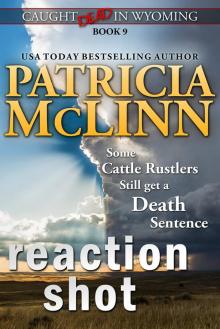 Reaction Shot (Caught Dead in Wyoming, Book 9)
Reaction Shot (Caught Dead in Wyoming, Book 9)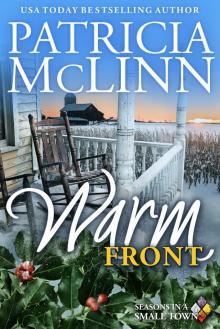 Warm Front
Warm Front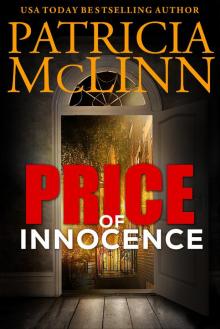 Price of Innocence
Price of Innocence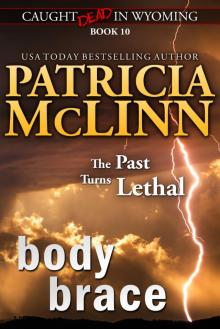 Body Brace (Caught Dead in Wyoming, Book 10)
Body Brace (Caught Dead in Wyoming, Book 10)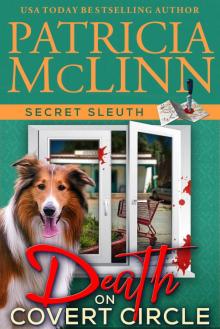 Death on Covert Circle
Death on Covert Circle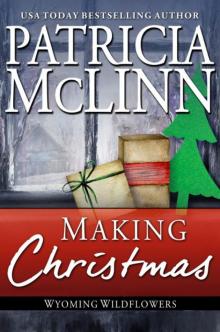 Making Christmas
Making Christmas Death on Torrid Ave.
Death on Torrid Ave. Death on the Diversion
Death on the Diversion The Rancher Meets His Match
The Rancher Meets His Match Widow Woman
Widow Woman The Runaway Bride
The Runaway Bride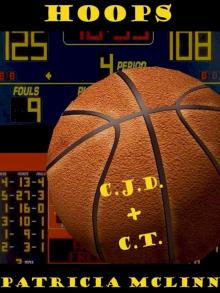 Hoops
Hoops A Stranger in the Family (Book 1, Bardville, Wyoming Trilogy)
A Stranger in the Family (Book 1, Bardville, Wyoming Trilogy)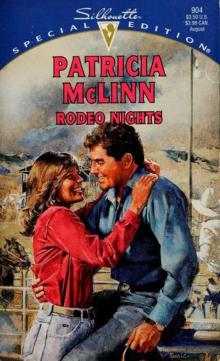 Rodeo Nights
Rodeo Nights Wedding Series Boxed Set (3 Books in 1) (The Wedding Series)
Wedding Series Boxed Set (3 Books in 1) (The Wedding Series) Sign Off (Caught Dead in Wyoming, Book 1)
Sign Off (Caught Dead in Wyoming, Book 1) Prelude to a Wedding
Prelude to a Wedding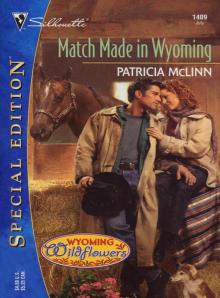 MATCH MADE IN WYOMING
MATCH MADE IN WYOMING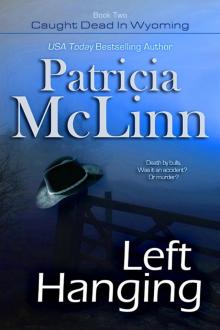 Left Hanging
Left Hanging What Are Friends For?
What Are Friends For?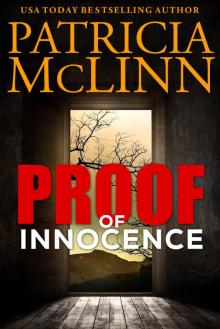 Proof of Innocence
Proof of Innocence Hidden in a Heartbeat (A Place Called Home, Book 3)
Hidden in a Heartbeat (A Place Called Home, Book 3) Baby Blues and Wedding Bells
Baby Blues and Wedding Bells Least Likely Wedding?
Least Likely Wedding? Heart Stealers
Heart Stealers Grady's Wedding
Grady's Wedding Right Brother
Right Brother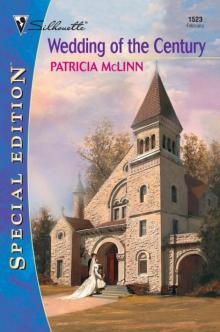 Wedding of the Century
Wedding of the Century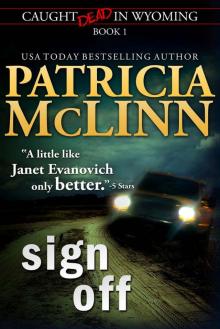 Sign Off
Sign Off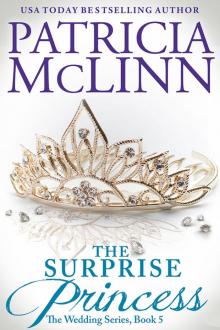 The Surprise Princess
The Surprise Princess Wyoming Wildflowers: The Beginning
Wyoming Wildflowers: The Beginning